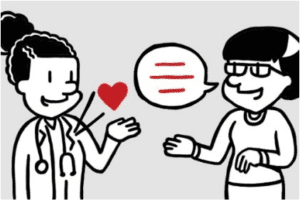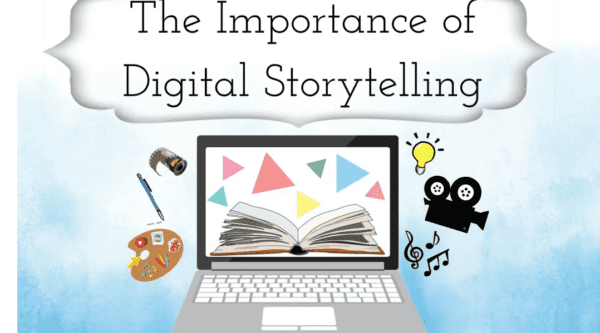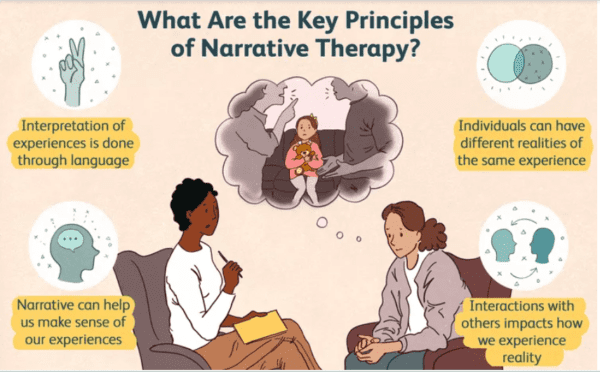By Harriet Sese
Healthcare storytelling is a powerful tool used in the medical field to create compelling medical content narratives and help patients, caregivers, and healthcare professionals communicate more effectively. Using narratives, healthcare providers can help patients understand their medical conditions and treatment options while providing emotional support and empathy. Medical content narratives can also educate and engage patients, helping them actively participate in their healthcare.
Narrative medicine is an emerging field that is focused on the use of storytelling in healthcare. A study published in the Journal of Medical Ethics states that narrative medicine can “foster empathy, reflection, and understanding among healthcare professionals, patients, and families.” By using narratives, healthcare providers can help patients feel heard and understood while gaining a deeper understanding of their experiences and perspectives.
Medical content narratives can take many forms, including patient stories, case studies, and educational materials. These narratives can help patients and healthcare professionals communicate more effectively while providing valuable insights into the patient experience. Whether you are a healthcare provider or a patient, healthcare storytelling can be a powerful tool for improving communication, building empathy, and enhancing the overall quality of care.

The Power of Storytelling in Healthcare
As a healthcare provider, you know the importance of quality patient care. However, have you ever considered the power of storytelling in healthcare? Stories can touch people’s hearts and minds, and they can be used to transform patient care. In this section, we will explore the concept of narrative medicine and how it can improve healthcare outcomes.
Understanding Narrative Medicine
Narrative medicine is an interdisciplinary field that focuses on using stories in healthcare. It recognizes that every patient has a unique story to tell and that by listening to these stories, healthcare providers can better understand their patient’s needs. Narrative medicine emphasizes treating the whole person, not just the illness. By using accounts to connect with patients, healthcare providers can provide more personalized care that considers the patient’s physical, emotional, and social needs.
Empathy and Patient Narratives
Empathy is critical to patient care; storytelling can help healthcare providers develop this vital skill. By listening to patient narratives, healthcare providers can better understand the patient’s experience and perspective. This can help providers develop a more profound sense of empathy and compassion, which can improve patient outcomes.
Patient narratives can also help healthcare providers identify issues that may not be immediately apparent. For example, a patient may be reluctant to take their medication because they are worried about the cost. By listening to the patient’s story, the healthcare provider can identify this issue and work with the patient to find a solution.
Storytelling has the power to transform healthcare. By using narrative medicine and listening to patient narratives, healthcare providers can provide more personalized care that considers the patient’s physical, emotional, and social needs. The development of empathy and compassion can also help improve patient outcomes. As a healthcare provider, it is essential to recognize the power of storytelling and to incorporate it into your practice.

Crafting Effective Medical Content Narratives
Creating effective medical content can be challenging but crucial to healthcare storytelling. In this section, we will discuss critical skills for medical writing and the role of digital storytelling in crafting compelling medical content.
Critical Skills for Medical Writing
Writing requires unique skills to communicate complex medical information effectively to patients and healthcare providers. Some of the essential skills for medical writing include:
- Clarity and Conciseness: Medical content should be clear and concise to ensure that patients and healthcare providers can easily understand the information presented.
- Accuracy: Medical content narratives must be accurate to prevent misinformation and ensure patients receive the correct information.
- Empathy: Medical content narratives should be written compassionately to help patients feel supported and understood.
- Cultural Competence: Medical content narratives should be culturally competent to ensure patients from diverse backgrounds can understand the information.
- Attention to Detail: Medical content narratives require attention to detail to ensure that all information presented is accurate and up-to-date.
The Role of Digital Storytelling
Digital storytelling can be a powerful tool for creating compelling medical content narratives. Digital storytelling allows healthcare providers to use multimedia elements such as images, videos, and audio to create engaging and informative content.
Digital storytelling can be used to:
- Educate Patients: Digital storytelling can educate patients about medical conditions, treatments, and procedures.
- Share Patient Stories: Digital storytelling can be used to share patient stories, which can help patients feel supported and understood.
- Promote Healthcare Services: Digital storytelling can be used to promote healthcare services and facilities, which can help patients find the care they need.

Crafting compelling medical content narratives requires critical skills for medical writing and digital storytelling. These tools allow healthcare providers to create compelling content that educates, informs, and supports patients.
Related Posts:
Educational Strategies in Healthcare
Medical education is a crucial aspect of healthcare that requires continuous improvement to keep up with industry trends and patient needs. To this end, healthcare storytelling has become an effective educational strategy in healthcare. Incorporating storytelling into medical education can help students develop a deeper understanding of patient experiences, improve their communication skills, and enhance their empathy towards patients.
Integrating Storytelling into Medical Education
Integrating healthcare storytelling into medical education is a powerful way to teach students about the human side of medicine. By sharing patient stories, students can learn about healthcare’s emotional and psychological aspects, often overlooked in traditional medical education. Healthcare storytelling can help students better understand cultural and social issues affecting patient health.
One way to integrate healthcare storytelling into medical education is by incorporating patient narratives into the curriculum. For example, students can read books or watch videos that feature patient stories. This approach can help students develop a more nuanced understanding of patient experiences and perspectives.
Another way to integrate healthcare storytelling into medical education is by using simulations. Simulations can help students develop their communication skills and empathy towards patients. For example, students can participate in role-playing exercises where they act out different patient scenarios. This approach can help students better understand patient experiences and improve their ability to communicate with patients.

Reflective Writing and Learning in healthcare storytelling
Reflective writing is another effective educational strategy in healthcare. Reflective writing involves writing about personal experiences and how those experiences have influenced personal growth and development. In medical education, reflective writing can help students develop a deeper understanding of their own experiences and how those experiences may affect their interactions with patients.
Reflective writing can be incorporated into medical education in several ways. For example, students can write reflective essays about their patient experiences or interactions with other healthcare professionals. This approach can help students develop a deeper understanding of their own biases and assumptions and how those biases may affect their interactions with patients.
Another way to incorporate reflective writing into medical education is by using journals. Students can keep journals throughout their medical education, reflecting on their experiences and how those experiences have influenced their personal growth and development. This approach can help students better understand themselves and their role in healthcare.
Generally, healthcare storytelling and reflective writing are effective educational strategies in healthcare. Integrating these strategies into medical education can help students better understand patient experiences, improve communication skills, and enhance their empathy towards patients. By incorporating these strategies into the curriculum, medical educators can help students become more well-rounded healthcare professionals.

Research and Evidence in Storytelling
As healthcare professionals increasingly recognize the importance of patient-centred care, storytelling has emerged as a valuable tool for medical content narratives. A growing body of evidence supports using narrative approaches in healthcare research, including systematic reviews and meta-analyses.
Systematic Reviews on Narrative Approaches
Systematic reviews have found that narrative approaches can effectively improve patient outcomes and increase patient engagement in their care. For example, a systematic review of 11 randomized controlled trials found that storytelling interventions improved patient satisfaction and knowledge of their condition. Another systematic review of 16 studies found that narrative interventions were associated with improved patient adherence to treatment plans.
Measuring the Impact of Storytelling
Measuring the impact of storytelling can be challenging, but evidence suggests that narrative approaches can effectively improve patient outcomes. For example, a study published in the Journal of General Internal Medicine found that patients who received a narrative intervention were more likely to adhere to their medication regimen than those who did not.
In addition to improving patient outcomes, narrative approaches can be helpful in health research. For example, a study published in the Journal of Health Communication found that narrative interventions were effective in increasing knowledge and changing attitudes about HIV/AIDS among college students.
The evidence suggests that narrative approaches can be valuable in healthcare research and practice. As healthcare professionals continue to explore the use of storytelling in medical content narratives, it will be necessary to examine the impact of these interventions further and identify best practices for their implementation.

Ethical and Cultural Considerations
When it comes to healthcare storytelling, ethical and cultural considerations are crucial in ensuring that narratives are adequate and appropriate for patients and healthcare providers. The following subsections explore critical moral and cultural references when creating healthcare narratives.
Ethics in Patient–Healthcare Provider Communication
Ethics inpatient–healthcare provider communication is essential to ensure patients receive the best care. One of the most important ethical considerations is obtaining informed consent from patients before using their stories in healthcare narratives. This means that patients should be fully informed about the purpose of the history and how it will be used, and they should have the right to refuse to participate.
Another important ethical consideration is the need to protect patient privacy and confidentiality. This means that healthcare providers should only use patient stories consistent with their wishes and not compromise their privacy or confidentiality.
Cultural Awareness and Healthcare Narratives
Cultural awareness is crucial in healthcare storytelling to ensure they are appropriate for patients from diverse cultural backgrounds. Healthcare providers must be aware of their patient’s cultural norms and values to ensure that the narratives are respectful and do not offend or alienate patients.
One way to promote cultural awareness in healthcare narratives is to use a moral imagination. A moral vision involves the ability to understand and empathize with the experiences of others, including patients from diverse cultural backgrounds. This can help healthcare providers create narratives sensitive to their patients’ needs and experiences.

Ethical and cultural considerations are essential when creating medical content narratives. Healthcare providers must obtain informed consent from patients, protect patient privacy and confidentiality, and promote cultural awareness in their records. Healthcare providers can create compelling, appropriate, and respectful narratives of their patients’ needs and experiences by considering these considerations.






